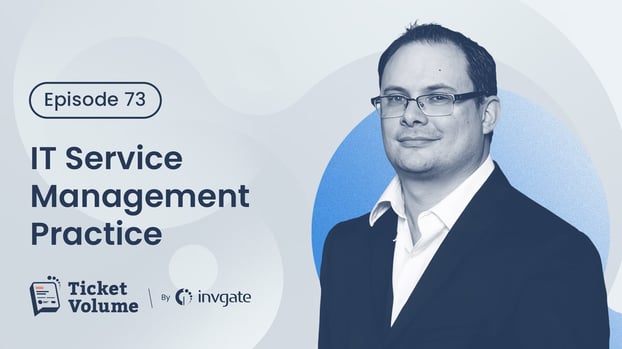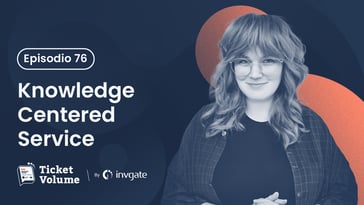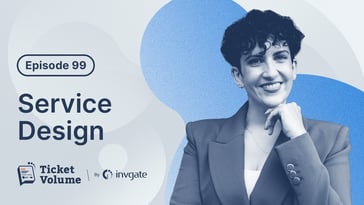While theoretical knowledge provides an understanding of useful concepts and frameworks, practice is key for IT Service Management (ITSM) success. More often than not teams find themselves working in intricate real-world scenarios, where they need an agile and hands-on approach to manage IT services effectively.
On the 73th episode of Ticket Volume, Ryan Ogilvie touched on this practical approach for ITSM success and shared with Matt Beran, our host, and the audience his extensive experience as an ITSM Consultant and Coach. He explored the frequent conflicts he sees across support teams, and explained the work he does with them to shift the focus inwards and to learn and improve from their own practice and experience.
Check out this recap of the episode, and don’t forget to sign up for our monthly webinars, where you can ask your questions live!

Analyzing ITSM success
During the first part of the episode, and taking on his over ten years of experience as a Consultant, Ryan Ogilvie explored the main pain points he sees in organizations that bring them away from IT Service Management (ITSM) success. In relation to this, he focuses on the need to step back and make more detailed analysis of how things are working.
To start, Ryan shares one of the first questions he asks when entering a team, and the answers he usually receives. When organizations are asked which processes they believe are operating well and what might need adjusting in their ITSM practice, a frequent type of answer he gets back is that “the Change Management processes are working really great, but Incident Management seems to be out of control.”
For this, Ryan’s strategy consists in trying to take the analysis a little bit further. In his example, he would return to the team with more questions such as “how great is great?," "who says it’s great?,” and “how do we quantify great?.” He argues that exercising these types of questions can help organizations take a step back from their tasks, look inwards, see how the different ITSM practices are connected and affecting each other, and maybe find out where to put the focus on to improve their service.
We tried to be as thorough as possible, but if you don't have enough time to read it through and through, here's (another) TL;DR: InvGate Service Management can do everything we say here, and you can test it right away for free for 30 days.
Learning from practice
Down the same line, Ryan points out the importance of organizations learning from and in their own practices instead of blindly following indications of a consultant. Each organization is different, and something that works for one, might not do the same for another when it comes to ITSM success.
Ryan finds that his job finds the best outcomes not when he brings in a specific approach to ITSM, but rather when he guides teams to ask themselves why they operate in certain ways, and draw their own conclusions as to how to improve. This means that once he leaves, people will understand the reasoning behind their work and, thus, engage better with it.
|
|
"When I work with a client I make sure to ask a lot of questions. And sometimes in their own answers they start to figure out their own problems. For me that’s even better, because if I’m figuring out something for them, then, once I’m gone, they might be like “we don’t really understand why we are doing this this way.” And quite often when I come to a client, they tell me “well, we just do it because this is the way we have been doing it, but we don’t really understand why.” Ryan Ogilvie |
Training and knowledge sharing
To follow, the episode shifts towards training and documenting ITSM processes, areas that Ryan also addresses in his consulting work. Once again, he puts ITSM practice in the center of success. For team members to show up and engage with training, they have to find it useful and easy to apply to their day to day operations. As for documentation, Ryan makes the argument that it should be absolutely practical; that is, short and easy and quick to understand and put into action.
|
|
"I try to keep the training as user-purposeful as possible. No one wants to read a Change Management process guide. You create one, because you need that artifact. The Compliance Department wants to see it, they want to know that it’s there. Twenty or less pages, I try to keep it as slim as possible. (...) So, having something simple like that, but also having quick reference guides, videos, things like that, so people can refresh, and it still makes sense after you’ve left." Ryan Ogilvie |
In relation to this, he explains that he often sees Knowledge Management falling short in organizations. This means, maybe they want to implement a new practice, and it ends up going wrong because they haven’t put together enough quality and accessible information to share with the teams to do so. Ryan explains that the best way to succeed in this is to not try and make long complicated guides, but to create short and practical steps that people will be more eager to reach out to and follow when on the run.
Final thoughts
This glimpse offers a preview of the insightful conversation with Ryan Ogilvie on episode 73 of Ticket Volume. The entire episode unlocks a rich source of valuable insights to help you achieve ITSM success from an expert that works every day doing exactly that. You can find the full episode on Apple Podcasts, Spotify, YouTube, or your favorite podcast platform.
And for those eager to join our interactive monthly webinars, don't forget to subscribe! Join our community to engage in vibrant discussions and stay linked to the dynamic realm of IT Service Management.















